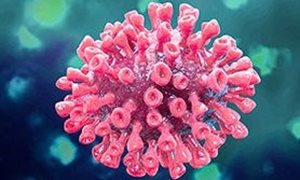26 May 2020
No matter how well astronauts and material are decontaminated, co-travelling microorganisms into space cannot be prevented. Given the enormous adaptability potential of bacteria, it is conceivable that they will sometimes survive space travel and be able to settle in an extraterrestrial environment.
For this study, four non-fastidious environment-derived bacterial species with pathogenic features were selected, including Klebsiella pneumoniae and Pseudomonas aeruginosa. A minimal 'diet' based on nitrogen, phosphorus, sulphur, iron and water to which carbohydrates found in carbonaceous meteorites were added was made to determine whether extraterrestrial survival and growth were possible. The four bacterial species were shown to survive and multiply on this minimal ‘diet’.
In follow-up experiments, the team of researchers observed that the adaptation of bacteria, especially in the case of K. pneumoniae, caused changes in the cell membrane - the shell of the cell - as a result of which the immune system reacted more strongly to the bacteria. In short, the bacteria become more immunogenic.
Research in cell culture, but also in mice, showed that the bacteria survive on extraterrestrial nutrients and become less virulent as a result of this necessary adaptation. At the same time, this research shows that bacteria can survive under these conditions, which means that the risk of infection among space travellers remains, precisely because - as other researchers have shown - a space journey has negative effects on the functioning of the immune system, making astronauts more susceptible to infections.


No matter how well astronauts and material are decontaminated, co-travelling microorganisms into space cannot be prevented. Given the enormous adaptability potential of bacteria, it is conceivable that they will sometimes survive space travel and be able to settle in an extraterrestrial environment.
For this study, four non-fastidious environment-derived bacterial species with pathogenic features were selected, including Klebsiella pneumoniae and Pseudomonas aeruginosa. A minimal 'diet' based on nitrogen, phosphorus, sulphur, iron and water to which carbohydrates found in carbonaceous meteorites were added was made to determine whether extraterrestrial survival and growth were possible. The four bacterial species were shown to survive and multiply on this minimal ‘diet’.
In follow-up experiments, the team of researchers observed that the adaptation of bacteria, especially in the case of K. pneumoniae, caused changes in the cell membrane - the shell of the cell - as a result of which the immune system reacted more strongly to the bacteria. In short, the bacteria become more immunogenic.
Research in cell culture, but also in mice, showed that the bacteria survive on extraterrestrial nutrients and become less virulent as a result of this necessary adaptation. At the same time, this research shows that bacteria can survive under these conditions, which means that the risk of infection among space travellers remains, precisely because - as other researchers have shown - a space journey has negative effects on the functioning of the immune system, making astronauts more susceptible to infections.

-
Want to know more about these subjects? Click on the buttons below for more news.
Related news items

Trained immunity: a tool for reducing susceptibility to and the severity of SARS-CoV-2 infection
17 February 2021 In a review in Cell Mihai Netea, Frank van de Veerdonk, Reinout van Crevel and Jorge Dominguez Andres propose that induction of trained immunity by whole-microorganism vaccines may represent an important tool for reducing susceptibility to and severity of SARS-CoV-2. read more
Invasive fungal infections in influenza and COVID-19
8 July 2020 The Aspergillus fungus is found in the lungs of many COVID patients. A parallel occurs with influenza patients, who often develop a serious fungal infection. Although such a serious fungal infection seems to occur less frequently in COVID-patients, alertness remains necessary, read more
Trained immunity: a tool for reducing susceptibility to and the severity of SARS-CoV-2 infection
29 June 2020 In a review in Cell Mihai Netea, Frank van de Veerdonk, Reinout van Crevel and Jorge Dominguez Andres propose that induction of trained immunity by whole-microorganism vaccines may represent an important tool for reducing susceptibility to and severity of SARS-CoV-2. read more.aspx?width=2120&height=1414&ext=.jpg&type=BlockColumn1Zoom1)
New insight into the effect of hydroxychloroquine undermines its use in corona
11 June 2020 Researchers at Radboud university medical center have discovered an as yet unknown effect of hydroxychloroquine. Raphael Duivenvoorden was interviewed in the program Op1 at NPO1 to elaborate on the findings. It seems unlikely that chloroquine has beneficial effect in corona infections. read more
Study into better protection for healthcare workers against coronavirus infection
19 March 2020 Radboudumc and UMC Utrecht will investigate whether health care workers are better protected against the coronavirus after a vaccination against tuberculosis (BCG vaccine). This vaccine does not directly protect against the coronavirus, but provides a boost to the immune system. read more
